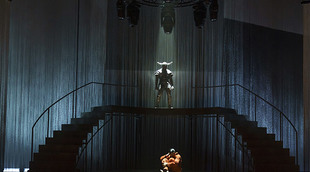 © Bill Cooper
© Bill Cooper
Hans Werner Henze’s Phaedra, with libretto by Christian Lehnert, was written in 2007, five years before the composer’s death and four years after he actually announced he was never going to write another opera. The first half relates the story of how Phaedra’s love for her stepson Hippolyt triggers catastrophe, as told by many writers across the ages including Euripides, Jean Racine and Sarah Kane. The second half, in contrast, follows a mythological tradition alluded to by Ovid, and sees the fatally wounded Hippolyt brought back to life under the new name Virbius. Now, however, he is only able to experience his own consciousness in a fragmentary, kaleidoscopic way.
The action in the second half occurs in Nemi in Italy and sees Phaedra as a bird mock Hippolyt, and she and Aphrodite claim him for the Underworld while Artemis tries to protect him. In this way Hippolyt finds himself thrown into caves, not recognising his own reflection in a pool and dreaming of distant gardens. He is finally resurrected as King of the Forest with what was, and what is to be, dissolving in dance.
Lasting just 100 minutes (including interval) the opera generates quite an intense experience. The libretto sometimes feels as if characters are consciously describing actions, events and feelings, which does not always enable emotions to flow naturally, but does fit with the stylised nature of ancient Greek drama. Henze’s score, which sees angular vocal lines give way to remarkable harmony writing as piano, an abundance of percussion, wind and brass and some pre-recorded sounds bombard the listener, also complements such stylisation. The consequence is that, while the opera may not always be that easy to follow, it does feel very much like a coherent whole.
Phaedra was conceived as a ‘concert opera’ with the aim of developing ‘a new kind of theatrical evening, reflecting and profoundly questioning the actualities of our way of looking at the world’. Noa Naamat’s staging in the Royal Opera House’s Linbury Studio would seem to fulfill this intention well as, against a background of stringed curtains, takis’s set presents a central circle surrounded by a curved staircase. In this way it feels as if the action is being presented in an arena, which certainly raises the metaphorical temperature. The experience is enhanced by the use of the theatre’s infrastructure so that when Hippolyt is caged the rigging that bears lights descends to enclose him. This central circle also proves highly versatile so that when Hippolyt runs in the opposite direction to which it revolves he gives the impression of travelling vast distances.
The characters often occupy the staircase facing outwards as they sing in harmony, while, through costume, expression and positioning, Aphrodite and Artemis are set up to be rivals who ultimately seem cut from the same cloth. Aphrodite’s close oversight of Phaedra (mirrored by Artemis’s of Hippolyt) is complemented by seeing her arm and disarm Phaedra at key moments with a knife, while the Minotaur’s horns also seem to imitate its blade. The staging is quite physical, as revealed in moments such as Phaedra’s attempted seduction of Hippolyt, while her acting out of the libretto by revealing bared teeth as these words are sung makes the drama feel highly immediate and appropriate.
The Southbank Sinfonia, conducted superbly by Edmund Whitehead, and the soloists, all of whom are current or future Jette Parker Young Artists, are very strong, and all work well with the grain of the piece. As Aphrodite Jacquelyn Stucker reveals an immensely full and accomplished soprano, while the countertenor of Patrick Terry as Artemis and bass-baritone of Michael Mofidian as Minotauraus also stand out. The highest accolades, however, go to Filipe Manu who reveals a smooth yet strong tenor as Hippolytus, and Hongni Wu whose mezzo-soprano glistens and gleams in a performance that displays as much beauty and passion as it does technical mastery of the lines.
By Sam Smith
Phaedra | 15 – 20 May 2019 | Linbury Studio, Royal Opera House, Covent Garden
the 18 of May, 2019 | Print


Comments